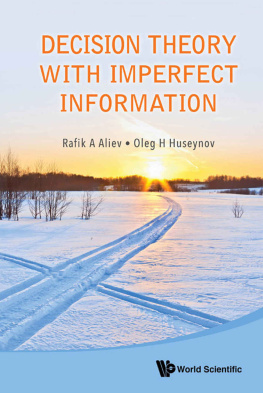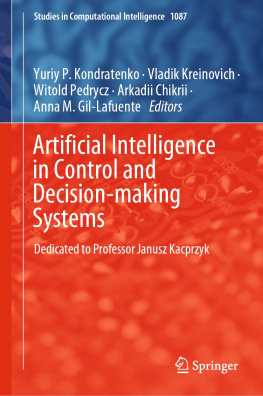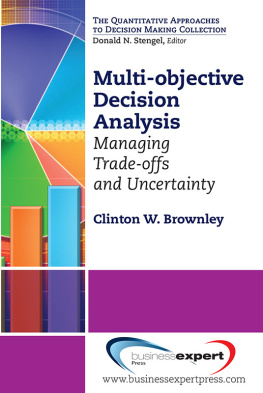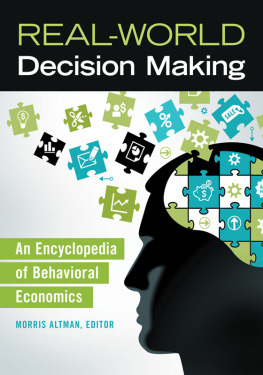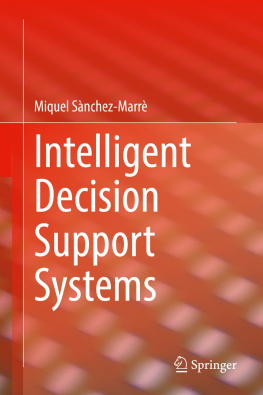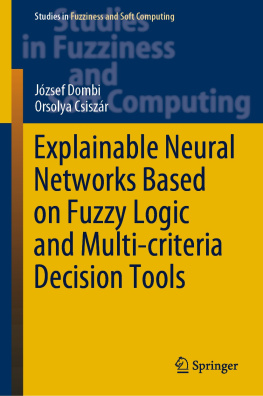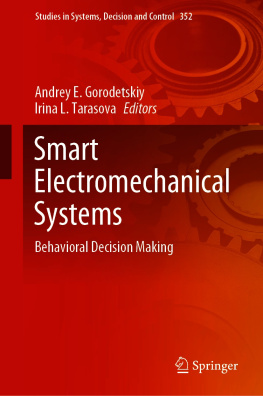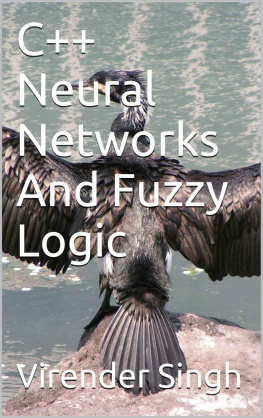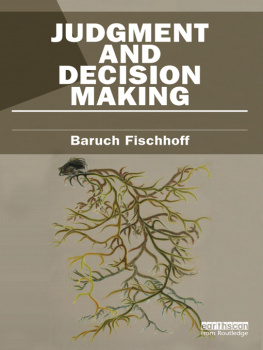DECISION THEORY WITH IMPERFECT INFORMATION
DECISION THEORY WITH IMPERFECT INFORMATION
Rafik A Aliev
Oleg H Huseynov
Azerbaijan State Oil Academy, Azerbaijan

Published by
World Scientific Publishing Co. Pte. Ltd.
5 Toh Tuck Link, Singapore 596224
USA office: 27 Warren Street, Suite 401-402, Hackensack, NJ 07601
UK office: 57 Shelton Street, Covent Garden, London WC2H 9HE
Library of Congress Cataloging-in-Publication Data
Aliev, R. A. (Rafik Aziz ogly), author.
Decision theory with imperfect information / Rafik A. Aliev & Oleg H. Huseynov (Azerbaijan State Oil Academy, Azerbaijan).
pages cm
Includes bibliographical references and index.
ISBN 978-9814611039 (hardcover : alk. paper)
1. Fuzzy decision making. 2. Decision making--Mathematical models. I. Huseynov, Oleg H., author. II. Title.
QA279.6.A45 2014
003'.56--dc23
2014022702
British Library Cataloguing-in-Publication Data
A catalogue record for this book is available from the British Library.
Copyright 2014 by World Scientific Publishing Co. Pte. Ltd.
All rights reserved. This book, or parts thereof, may not be reproduced in any form or by any means, electronic or mechanical, including photocopying, recording or any information storage and retrieval system now known or to be invented, without written permission from the publisher.
For photocopying of material in this volume, please pay a copying fee through the Copyright Clearance Center, Inc., 222 Rosewood Drive, Danvers, MA 01923, USA. In this case permission to photocopy is not required from the publisher.
Printed in Singapore
Dedication
Dedicated to the memory of my wife Aida Alieva
RAFIK ALIEV
To my parents and grandparents
OLEG HUSEYNOV
Foreword
Professor Alievs magnum opus, Decision Theory with Imperfect Information (with a Foreword by Prof. Lotfi Zadeh), or DTII for short, is a path-breaking contribution to a better understanding of how to make decisions in an environment of imperfect informationinformation which is uncertain, imprecise, incomplete or partially true. In real-world settings, such information is the norm rather than exception. Professor Alievs work builds on existing theories of decision-making, but leaves them far behind.
Decision theory as we know it today, is rooted in the pioneering work of von Neumann and Morgenstern, Theory of Games and Economic Behavior, 1944. von Neumann and Morgensterns brilliant work spawned a huge literature. A notable development in the evolution of decision theory was the development of Prospect Theory by Kahneman and Tversky in 1979a theory for which they were awarded the Nobel Prize in economics in 2002. Prospect theory was an important step in the direction of enhancing the capability of decision theory to deal with real-world problems. Professor Alievs magnum opus contains a very insightful and very detailed critical analysis of existing theories of decision-making. Existing theories contain much that is deep, rigorous and elegant. However, there is a basic problem. Existing theories are based on the classical, Aristotelian, bivalent logic. Bivalent logic is intolerant of imprecision and partiality of truth. Fundamentally, bivalent logic is not the right logic to deal with the pervasive imprecision of the real world. Professor Alievs work shifts the foundation of decision theory from bivalent logic to fuzzy logic. Informally, fuzzy logic is a system of reasoning and computation in which the objects of reasoning and computation are classes with unsharp (fuzzy) boundaries. In the real world, such classes are the norm rather than exception. It is important to note that almost all words in a natural language are labels of classes with unsharp boundaries. Examples. Tall, cheap, fast, usually, most, likely, etc. Representation of the meaning of such words as probability distributions, is not effective. In the realm of decision theory, what is of particular importance is representation of imprecise probabilities and imprecise rewards as fuzzy probabilities and fuzzy rewards, respectively. In Professor Alievs work these and other concepts are allowed to be described in a natural language. One of the major contributions of Professor Alievs work is the development of a conceptual framework for decision-making and computation with information which is described in a natural language.
A concept which plays an important role in computation with natural language is that of precisiation of meaning. Informally, if p is a proposition drawn from a natural language, then its meaning is precisiated by representing it in a mathematically well-defined form. More concretely, p may be viewed as a carrier of information about a variable, X, which in general is implicit in p. Information about X may be viewed as a restriction on the values which X is allowed to take. There are many kinds of restrictions. Principally, restrictions are possibilistic, probabilistic and bimodal. A bimodal restriction is a mixture of possibilistic and probabilistic restrictions. Example. It is likely that X is small, is a bimodal restriction. In large measure, a natural language is predominantly a collection of possibilistic and bimodal restrictions. This is why the concept of a restriction plays an important role in Professor Alievs work.
In existing theories of decision-making and economic behavior, imperfect information is dealt with through the use of probability theoryand only probability theory. The conventional wisdom is that probability theory is all that is needed to deal with any kind of uncertainty. This is the core of the Bayesian doctrine. The insufficienists, including Professor Aliev and myself, do not share this view. More concretely, there are three principal types of uncertainty. Type 1 uncertainty relates to randomness. Type 2 uncertainty relates to incompleteness of information. Type 3 uncertainty relates to unsharpness (fuzziness) of class boundaries. Probability theory is rooted in uncertainty of Type 1. However, over the years, probability theory moved in the direction of enlarging its domain to accommodate uncertainty of Type 2. Bayesianism is a manifestation of this move. A controversial issue is: Is probability theory the right theory to deal with uncertainty of Type 3? My position is: No, it is not. What is needed for dealing with uncertainty of Type 3 is fuzzy logic and its important constituent, possibility theory. Probability theory and possibility theory are distinct theories with distinct agendas.
Fuzzy logic plays a minor role in existing theories of decision-making and economic behavior. In sharp contrast, fuzzy logic plays a pivotal role in DTII.
To understand Professor Alievs work, familiarity with fuzzy logic is a necessity. DTII includes a very readable and authoritative exposition of fuzzy logic. What is very impressive is that in DTII what is employed is not merely the basic machinery of fuzzy logic, but the most advanced concepts and techniques. Specifically, one finds in DTII applications of extended fuzzy logic, fuzzy geometry and the calculus of Z-numbers. A Z-number is expressed as (value of a variable, certainty of value). Typically, the components of a Z-number are described in natural language. Example. (High reward, likely). What is important about Z-numbers is that in real-world settings much of uncertainty involves variables whose values are Z-numbers.
Professor Alievs work brims with new concepts, new methods and new ideas. For me, it is hard to find adequate words to describe the fundamental importance of the theory which Professor Aliev has constructeda theory which is likely to find wide-ranging applications in real-world settings. Professor Alievs preface speaks for itself.
Next page
